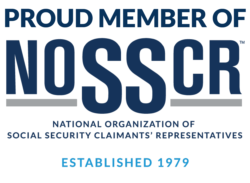What is obsessive compulsive disorder and how can it be disabling?
by Eric Slepian
At our law firm, we advocate for clients with a wide range of physical or mental impairments that alone or in combination result in disabling conditions that prevent them from working. When the disability is expected to last at least one year or result in death, the person is like eligible for Social Security Disability Insurance or Supplemental Security Income, SSDI or SSI respectively, depending upon the claimant’s work history and other eligibility factors.
In some cases, proving disability based completely on or in combination with a mental impairment can seem difficult to prove, since a mental or emotional condition is not as easy to identify as a disease or injury that can be conformed by a lab test, biopsy or scan. But mental disorders are sometimes just as disabling, and the evidence of mental impairment can be provided to the Social Security Administration at a level of proof at which the disability is clear.
For example, mental health providers like social workers, psychologists or psychiatrists can administer screening tools and tests for OCD. In addition, a statement by a treating mental health provider detailing why they made the diagnosis, what obsessions and compulsions are present and how they interfere with life, as well as other related symptoms like fear, anxiety, difficulty leaving home, fatigue and others.
One illness in this category is obsessive compulsive disorder, an anxiety disorder referred to as OCD. The National Institute of Mental Health defines OCD as a “common, chronic and long-lasting disorder in which a person has uncontrollable, reoccurring thoughts (obsessions) and behaviors (compulsions) that he or she feels the urge to repeat over and over.”
While most people have occasional obsessive thinking or compulsive behavior, with OCD these patterns become so frequent that they begin to interfere with daily life. The OCD patient knows the obsessive thoughts are not true or are being generated from the disease, but they cannot stop them, and they may be unable to control the compulsions that follow despite knowing that the actions may not be rational.
Common manifestations may include:
- Fear of contamination or germs that cause constant handwashing or exhausting cleaning
- Urge to have items in a certain order or placement, or for symmetry of objects or of language, or an urge to count in a certain pattern
- Unwelcome thoughts of aggression, religious concerns or taboo topics
- Uncontrollable checking such as of whether a door is locked, a hot appliance turned off or repeatedly checking the road to be sure the person did not strike a person or animal with a vehicle
- And more
The Social Security Administration or SSA has a listing of impairments so severe that if a claimant meets or equals a listing, they are automatically found disabled. OCD is one of these listed impairments (Listing 12.06). The listing’s requirements are very detailed. An attorney can assist with developing the medical evidence to show how the condition meets or equals that listing.
Even if the listing is not met, the claimant still could be found disabled if considering their age, education, limitations and impact of their impairments, there are no jobs in significant numbers the person could perform.



